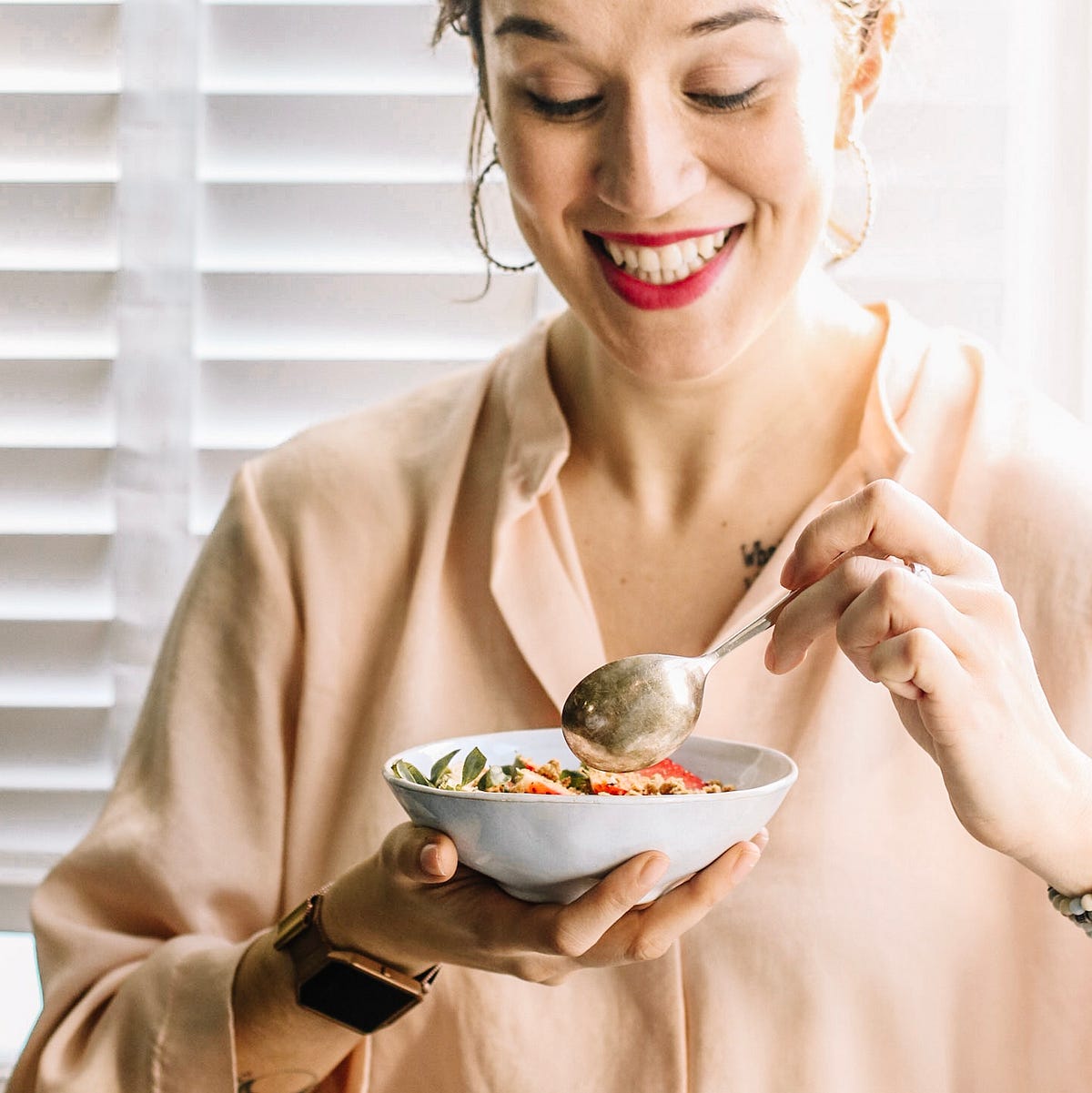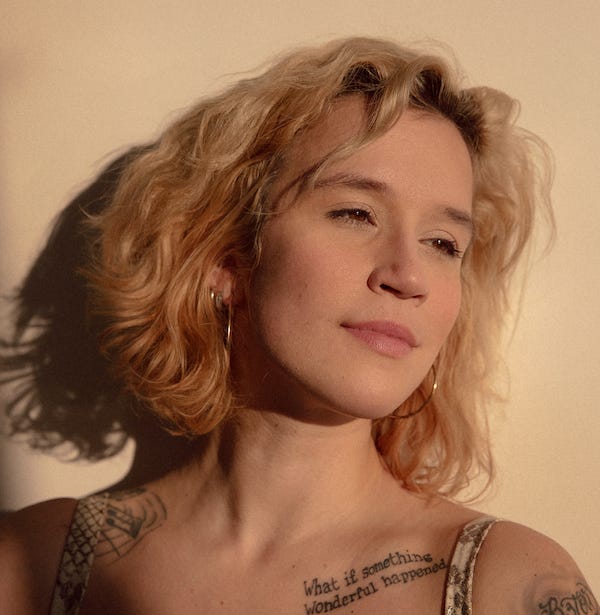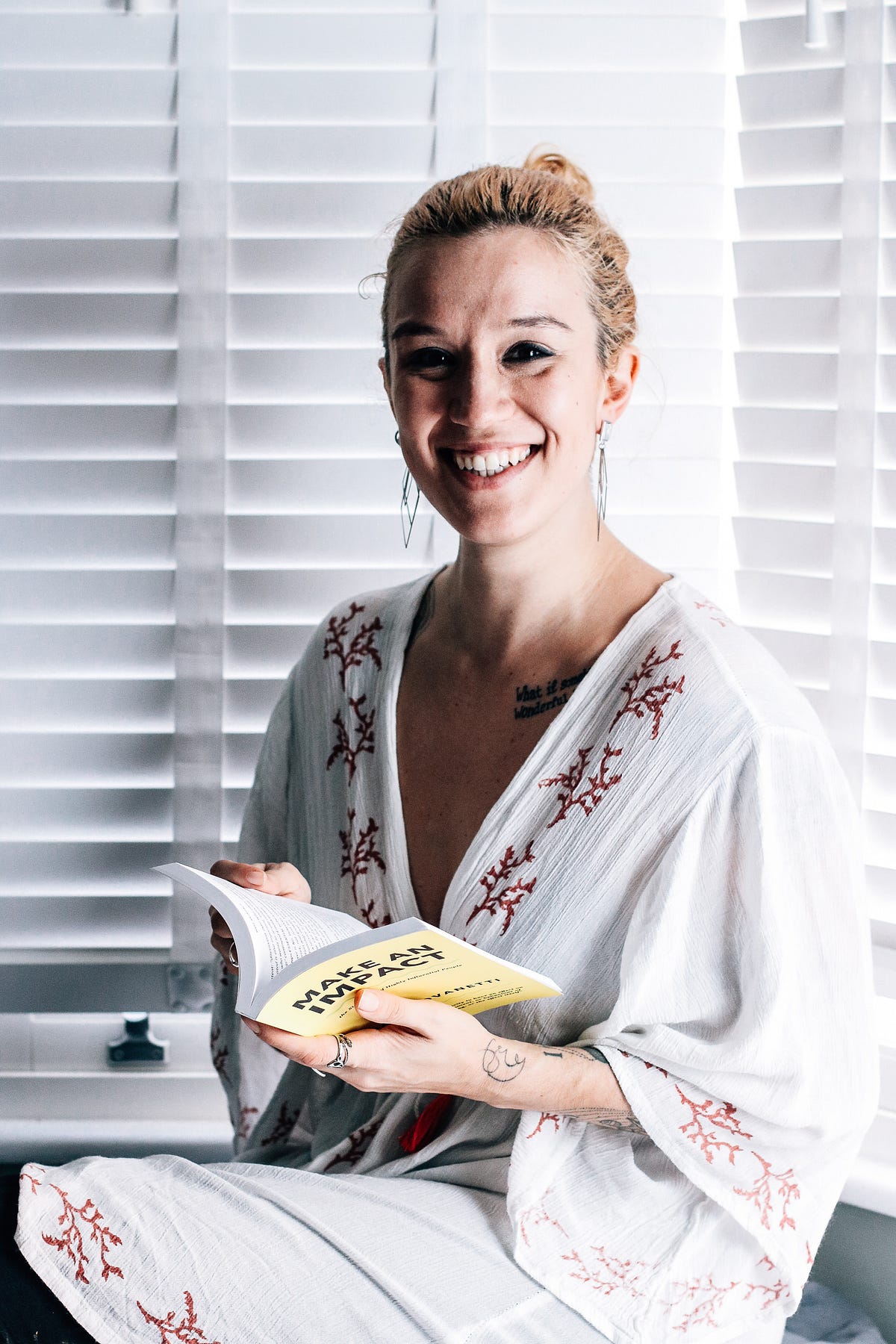
Hit the panic button. Every time I feel stressed I consciously take a one minute “emergency” meditation. It helps — It really does.
When we want to build muscles in our body, we go to the gym and work out. If we do this consistently, we will see changes in our physique. Being able to PAUSE (“hit the panic button”) is the same way. If we consistently practice using mindfulness tools to help us slow down, we can more easily grab onto them in challenging times. These practices don’t have to be long or involved. They do, however, have to be consistent.
As a part of my series about “How to Slow Down To Do More” I had the pleasure to interview Fab Giovanetti. Fab is a business mentor, published author, influencer-specialist, best known as the founder of the Health Bloggers Community. Serial startup founder and professional troublemaker, she is obsessed with avocados and helping people making an impact in health and wellness.
Thank you so much for joining us! Can you tell us the “backstory” about what brought you to this specific career path?
I mainly did it to create a community that would understand me and share my passion. Little I knew building communities and help them develop would become my whole business model! The drive to help others kept me going really.
According to a 2006 Pew Research Report report, 26% of women and 21% of men feel that they are “always rushed”. Has it always been this way? Can you give a few reasons regarding what you think causes this prevalent feeling of being rushed?
It sounds corny but the online world we live in is seriously impacting the way we live our lives and we go about our days. Most of us, regardless of whether we are millennials or not, are relying on our phones and laptops when it comes to our daily tasks and appointments, our reminders and news updates. No wonder we feel frazzled!
Based on your experience or research can you explain why being rushed can harm our productivity, health, and happiness?
It’s pretty simple, if you ask me: multi tasking does not equal being more productive. Single focus is more efficient, not just when it comes to the energy we are putting into something, but also with regards to the way we perform. It can take up to 45 mins to gain full attention after we get distracted by, let’s say, a notification. That says a lot.
On the flip side, can you give examples of how we can do more, and how our lives would improve if we could slow down?
Slowing down instantly makes us more aware of what is around us, which also helps us focusing on the good around us. Never underestimate the power of gratitude! Also slowing down means we consciously prioritise, and prioritisation is one of the key practises within essentialism.

We all live in a world with many deadlines and incessant demands for our time and attention. That inevitably makes us feel rushed. Can you share with our readers 6 strategies that you use to “slow down to do more”? Can you please give a story or example for each?
- Hit the panic button — every time I feel stressed I consciously take a one minute “emergency” meditation
- Write your todo list on paper — if you feel you have a lot to do, transfer all of your tasks on paper, it will help you choose the most important tasks
- Set an autoresponder — you are feeling overwhelmed with your emails, autoresponders can help set people’s expectations
- Have a day off — have a day where you consciously make sure you do not check emails, and even your phone. I do this every week and truly makes me feel recharged
- Start your morning right with half an hour without looking at any screen — I love starting my morning with a cup of tea, meditation and journaling. Starting my day slow really helps me to set the day
- Set timers for yourself — a small exercise is to test the Pomodoro technique and set timers for yourself, and every 25 minutes take a five minute break
How do you define “mindfulness”? Can you give an example or story?
Mindfulness is the capacity to be in the moment when doing a specific activity. My favourite mindfulness example is the washing the dishes one. Have you ever set yourself to wash up the dishes and put a Podcast on in the background? When you are washing the dishes, just wash the dishes. When you are eating, just eat.
Can you give examples of how people can integrate mindfulness into their everyday lives?
With so many meditation apps at our fingertips, I think those are incredibly useful for commuters, or people looking to be more aware in their everyday life. How many time do we walk with the purpose of walking, looking at what’s around us?
Do you have any mindfulness tools that you find most helpful at work?
My notebook really helps me get focused — I find that if I am always flicking through tabs and screens being able to just look at my notebook and draft ideas there centers me and allows me to reset.

What are your favorite books, podcasts, or resources that inspire you to use mindfulness tools or practices
I love the new collaboration between Headspace and Nike Running app. Being able to run whilst having a meditation session really changes the way you experience mindfulness and body and mind feel truly connected. It completely changed the way I run.
Can you please give us your favorite “Life Lesson Quote”? Can you share how that was relevant to you in your life?
“Let it go and surrender” Stop controlling everything! Doing more and rushing everywhere shows a tendency to wanting to control everything. Being able to let go and stop wanting to do everything creates more time for what really matters.
You are a person of great influence. If you could inspire a movement that would bring the most amount of good to the most amount of people, what would that be? You never know what your idea can trigger. 🙂
Allowing people to reclaim their day off by using techniques to be more efficient and stop feeling guilty about reclaiming be time for themselves. A silent revolution, but one that needs to be talked about!
Thank you so much for these insights! This was so inspiring!
About the Author:
After 15 years working in Commercial Real Estate in New York City, Ashley Graber changed the coast she lived on and the direction of her life from Real Estate to the worlds of Psychology and Meditation & Mindfulness. Ashley came to these practices after getting sober and in the decade plus since, she now runs a busy mindfulness based psychotherapy practice at Yale Street Therapy in Santa Monica, CA where she see adults and children and speaks on the benefits of meditation and mindfulness practices.
Ashley is an Owner and Director of Curriculum for the next generation meditation app & mindfulness company ‘Evenflow’ and launched the company’s one to one online mindfulness mentoring program. Ashley also educates teachers and administrators in schools and presents in businesses across Santa Monica and Los Angeles.
Ashley was trained in Meditation and Mindfulness practices by prominent teachers; Elisha Goldstein, Richard Burr and Guiding teacher at Against the Stream Boston, Chris Crotty. Her Mindfulness Based Stress Reduction (MBSR) certification was done through The Center for Mindfulness at UC San Diego. Additionally, Ashley is trained by Mindful Schools to teach Meditation and Mindfulness practices to children and families. Ashley’s unique combination of psychotherapy, trauma reprocessing and meditation and mindfulness practices make her a sought after therapist and mindfulness educator and speaker. Her passion for the benefits of mindfulness practices as well as her enthusiasm for helping young kids and adults is the drive to teach these very necessary, life long skills and why she wrote and runs the Mindfulness for Families program at The Center for Mindful Living. This is where she teaches groups of families with children ages 6–12.
Ashley was featured on Good Morning LaLa Land, presented on Resilience at the renowned Wisdom. 2.0 Mindfulness & Technology conference, and presented at the TED Woman conference offering an in-depth look at the profound psychological and physiological consequences of chronic stress, and how meditation and mindfulness practices can alleviate these effects. Ashley is also a nationally syndicated columnist on Thrive Global and Medium Magazine.


